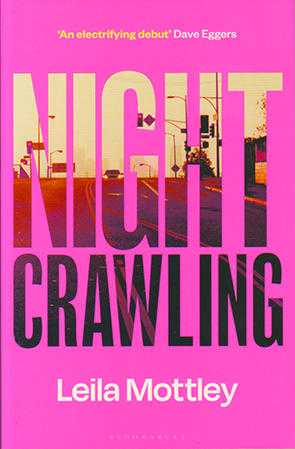As I begin this review a couple of things have recently happened. First, the Oakland police department in California was put on a one year probation in May, ending federal oversight against corruption. Second, Leila Mottley, a first-time novelist, became the youngest author ever to be longlisted for the Booker Prize last week for Nightcrawling, a novel about sexual exploitation and corruption. The connection lies with the inspiration for Mottley’s story. An Oatland police officer killed himself in 2015, leaving a suicide note that detailed the sexual exploitation of a young girl by himself and other police. An investigation was launched which resulted in the firing of several officers and the suspension of others. The victim, who went by the pseudonym ‘Celeste Guap’ at the time to protect her identity, was eventually awarded almost a million dollars. However, this particular scandal was not the catalyst for federal oversight. That began with another scandal in 2000 that involved an anti-gang unit from Oakland police who called themselves “the riders”, who were found to have beaten and framed suspects, and falsified police reports. Corruption seems to have been endemic in this police precinct. Issues of police violence and unwarranted shootings have also plagued Oatland. However, neither the “riders” scandal nor a host of other scandals that have plagued Oakland’s Police department since 2000 are the subject of this novel.
For those interested in the background of the novel, the following articles give a good broad overview of the history of Oakland Police Department scandals and the background to Mottley’s story:
Oakland residents remain skeptical as federal oversight of police ends after 20 years – NPR
Four Oakland police officers fired, seven suspended, in sexual misconduct case – The Guardian
Oakland To Pay 19-Year-Old Nearly $1 Million In Police Scandal Settlement – NPR
Revisiting the Celeste Guap Case Four Years Later
The experiences of Mottley’s protagonist, Kiara, and the circumstances of her case follow the broad outlines of the original scandal from 2015. It was reported that:
- police officer, Brendan O’Brien left a suicide note indicating he had been having a sexual relationship with a young prostitute. The note helped to launch an investigation into widespread misconduct allegations;
- the girl had had sex with more than a dozen Oakland police officers;
- officers tipped off the girl to prostitution stings in exchange for sex.;
- officers were passing her around;
- at least three officers had sexual relations with the girl when she was underage;
- the Oakland’s Police Department cycled through three police chiefs in nine days when the scandal broke.
Given the story’s grounding in real events, it is important to consider what the novel is and is not. Nadifa Mohamed’s The Fortune Men, shortlisted for last year’s Booker Prize, is also based on real incidents dating back to the 1950s in Cardiff, so it is an interesting comparison to make. Mohamed’s novel strayed from the basic facts of the story here and there – of a black man executed for a murder of which he was falsely accused – but her intention is to dramatize Mahmood Mattan’s fate and the injustice of his situation. There is something similar happening in Nightcrawling, but I think Mottley has set out to achieve a different political outcome. She states in her author’s note that she had wanted to explore what it would be like for a black woman to have experienced sexual exploitation at the hands of police. In essence, she wanted to go beyond what I have offered above – a series of links to news articles – and to create “a world beyond the headline, and for readers to have access to this world.” Mottley wanted to put a ‘face’ on the story and to achieve a level of empathy for the character and her situation.
As Mottley demonstrates in a court room scene in which Kiara testifies in front of a grand jury, it is easy for prejudice to be turned against someone in Kiara’s situation; how the ‘headlines’ of a story – poverty, race and the seemingly salacious aspects of a situation – can turn opinion. On the face of it, Kiara is a young, unemployed black girl prostituting herself on the streets. Her mother has only recently been released from incarceration after a terrible family tragedy, her brother is in jail waiting to face drug charges, and her father had also served time before he died. It is the kind of litany too often iterated as a mantra against the poor and marginalised in society. The power of this discourse lies in its prevalence, and its reiteration forms a moral truth that elides the humanity of its subject. This is the ‘headline’ that Mottley writes against in an attempt to represent the lives of the marginalised: “of black women, and queer and trans folks … that would reflect the fear and danger that comes with black womanhood and the adultification of black girls.” Mottley’s term ‘adultification’ refers to general perceptions identified in several studies that show black girls are perceived as more adult-like, less innocent, and are therefore likely to receive more punitive treatment rather than protection from authority figures like teachers or police.
However, whereas Mohamed changes some details here and there around the edges of her treatment of Mahmood Mattan’s situation, Mottley introduces substantial details and changes important outcomes from the original story of Celeste Guap. Kiara is only 17 years old when she is first prostituted among the police, but Mottley effectively makes her a mother by giving her the responsibility of raising nine-year-old Trevor, the son of her neighbour, Dee, addicted to crack. She is also attempting to support her older brother, Marcus, who deludes himself into believing he will be a recording star after their Uncle Ty has had some success. And Kiara makes every effort she can to acquire the means to make money to pay the escalating rent and put food on the table. The matter of her prostitution is somewhat accidental, and the hold exerted over her by the police who exploit her is far more subtle than simply being physically restrained from fleeing the situation, as is suggested by the District Attorney in his cross-examination.
Mottley’s story gives a voice to figures who are often marginalised and vilified. Camila, a trans prostitute, takes pride in the clientele she has established, which has allowed her to leave the streets and to work with more dignity and safety. But Camila – like Kiara, like Marcus who believes he has a path to follow a dream – finds that her life is vulnerable and the hard-won gains she has made are easily swept aside. It is fitting, then, that a key motif in the novel is the swimming pool outside Kiara’s apartment building. Dee’s boyfriend, as a parting defilement, has thrown bags of dog shit into the pool, gathered from dumpsters in the area. Kiara is appalled at the thought of the pool, with its lingering faecal traces. She nevertheless climbs into the pool to swim with Trevor, and she reminds herself after that, that her life is like a “shit pool”, forever pulling her in, and through which she must wade.
Mottley’s intention is to dramatize the circumstances that push people like Kiara to the edge of their dignity and place them in situations for which they might be judged. However, as suggested by her author’s note, Mottley is not committed to telling a particular story, as might a docu-drama or non-fiction account; rather, Nightcrawling represents the plight of a class of people, who also suffer under the burden of racial and sexual assumptions. Mottley’s divergence from the story of Celeste Guap shows this, and suggests that Gaup’s eventual compensation does not represent a solution to the social and institutional barriers faced by people like Kiara, no matter how welcome that particular outcome might be.
Mottley was only nineteen years old when Nightcrawling was published. She wrote the book before she turned eighteen and had had to wait until she turned eighteen before she could sign publishing contracts. It suggests how close Mottley must have felt to her subject. In her novel, police who intend to effect a cover-up wait until Kiara is eighteen before they bring her into the police station to interview her. The news story of Celeste Guap broke when Mottley was fifteen, only a few years younger than Gaup. Nevertheless, Nightcrawling is written with all the skill and assurance of a much older, much more experienced author.

 RSS Feed
RSS Feed Facebook
Facebook Instagram
Instagram YouTube
YouTube Subscribe to our Newsletter
Subscribe to our Newsletter





No one has commented yet. Be the first!